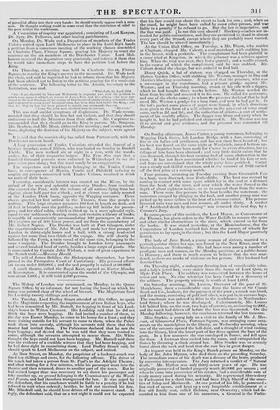The Bishop of London was summoned, on Monday, to the
Queen Square Office, by an informer, for not having the board on which his name was painted clear of the wheel of his cart. The Magistrate fined his Lordship twenty shillings and costs.
On Tuesday, Lord Dudley Stuart attended at this Office, to speak to the Magistrate respecting the imprisonment of two Italian boys, who had been committed by Mr. Burrell, for begging in front of his Lord- ship's house in 1Vilton Crescent. His Lordship said that he did not think the boys were begging. He had invited a number of them, as the day was Easter Monday, to come to his house for a feast ; and-they were waiting outside for his servant to come to them, when the Police took them into custody, although his servants told them that their master bad invited them. The Policeman declared that he saw the boys begging; and denied that he was told that they were invited to come, although the servants attempted to rescue them. Mr. White thought the boys could not have been begging. Mr. Burrell said there was the evidence of a credible witness that they had been begging, and he had done right in committing them. Lord Dudley Stuart said, he should speak to Lord Melbourne on the subject, and retired.
At Bow Street, on Monday, the proprietor of a hackney-coach was fined ten shillings and costs, for the following offence. The driver of his coach had taken a person from St. PauPs.to the Adelphi Theatre ; and after waiting for a few minutes, while his passenger went into the theatre and then returned, drove to another part of the town. But he had waited longer than was necessary to set down his passenger and take another up, on ground belonging to the Commissioners of the Woods and Forests, and had therefore transgressed the law. It was urged by the defendant, that his coachman would be liable to a penalty if he had refused to wait when ordered ; besides, he had not received his fare. Mr. Minshull said, he should have driven off to the nearest stand. In reply, the defendant said, that on a wet night it could not be expected that his fare would run about the street to look for imam; and, when un the stand, he might have been called by some other persun, and was liable to a penalty if he refused to go. But the law is imperative, and the fine was paid. Is not this very absurd ? Hackney-coaches are in- tended for public convenience, and they are permitted to stand in almost every part of the Strand, except where they are probably most wanted. The law should be altered immediately.]
At the Union Hall Office, on Tuesday, a Mr. Dixon, who resides at Clapham, charged Mr. Culeott, a coal-merchant, with stabbing him in the breast, with a penknife. The complainant had been plaintiff in a cause tried at Kingston, in wlikh the prisoner was u witness against him. When the trial was over, they had a quarrel ; and a scuttle ensued, in the course of which the complainant said he was stabbed. Mr. Calcott denied the charge, but was ordered to find bail.
Henry Quick, a lad of sixteen, was charged un Thursday, at the Hutton Garden Office, with stabbing Mr. Weston, manager in Day and Martin's blocking-warehouse. It appeared that the prisoner, who was a messenger in the warehouse, had a private grudge against Mr. Weston ; and on Thursday morning, struck at Iris side with a dagger, which he had bought three weeks before. Mr. Weston warded the blow from his side and received it in his arm. lie called for assistance, and one of the clerks came; to whom the prisoner declared that he had owed Mr. Weston a grudge for in long time, and now he had got it. In the lad's pocket some pieces of paper were found, in which directions were given in the form of a will, relative to the paprent of some small sums, such as 2d. and Pd., and the collection of others—a sort of settle- ment of his worldly affairs. The dagger was blunt and rusty when he bought it, but he had polished and sharpened it. Mr. Weston was too ill to attend and give evidence, and the prisoner was remanded till Monday.
















 Previous page
Previous page